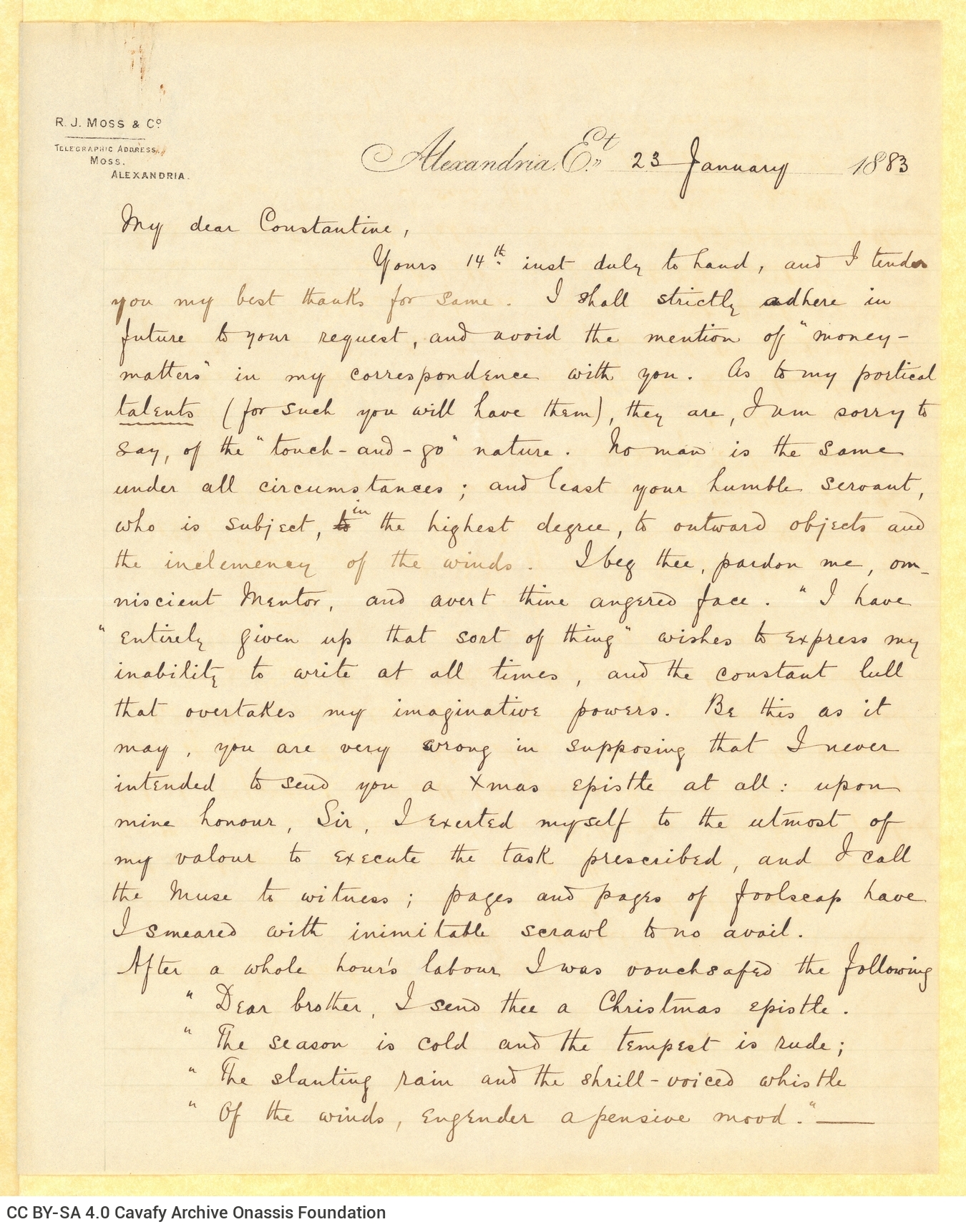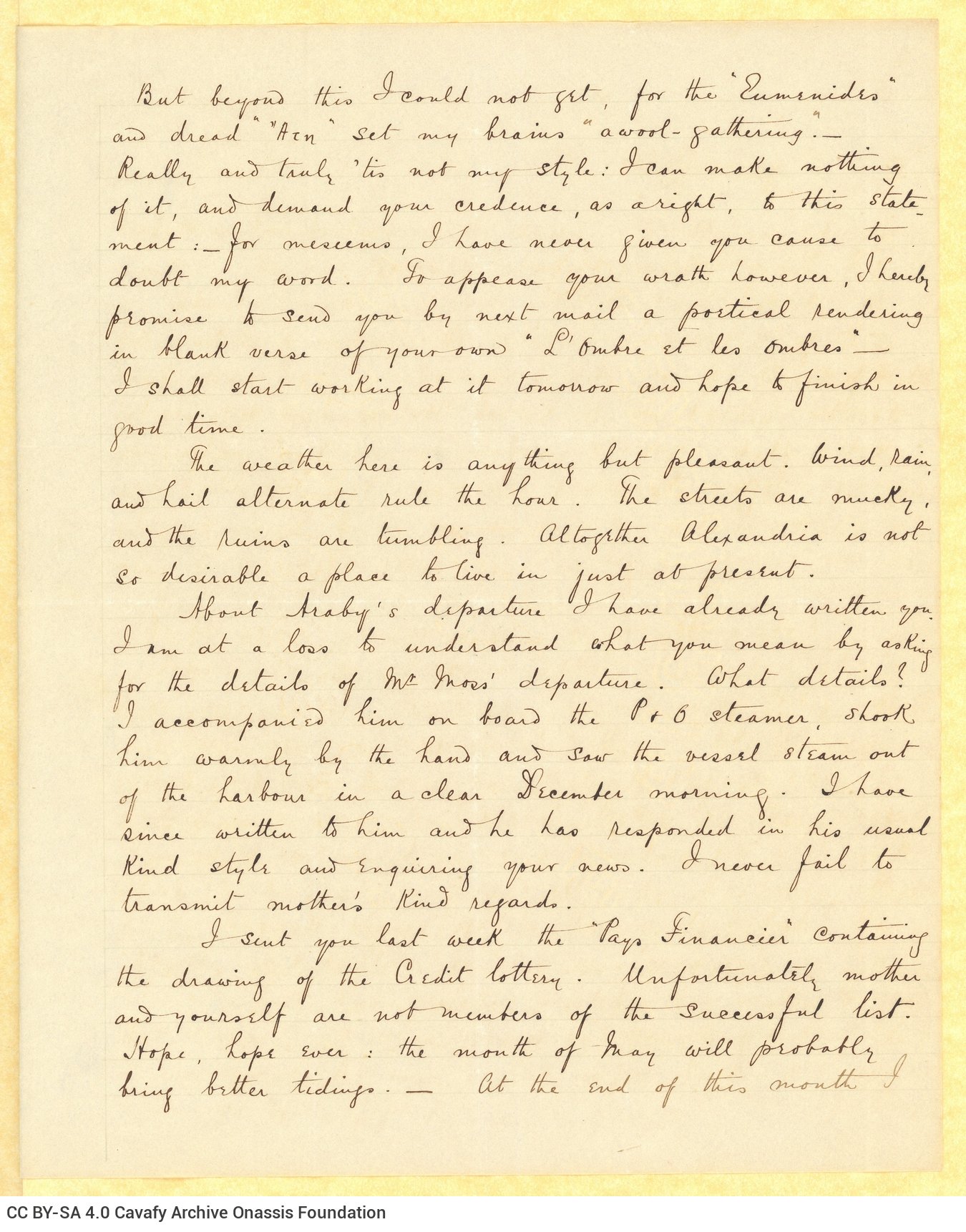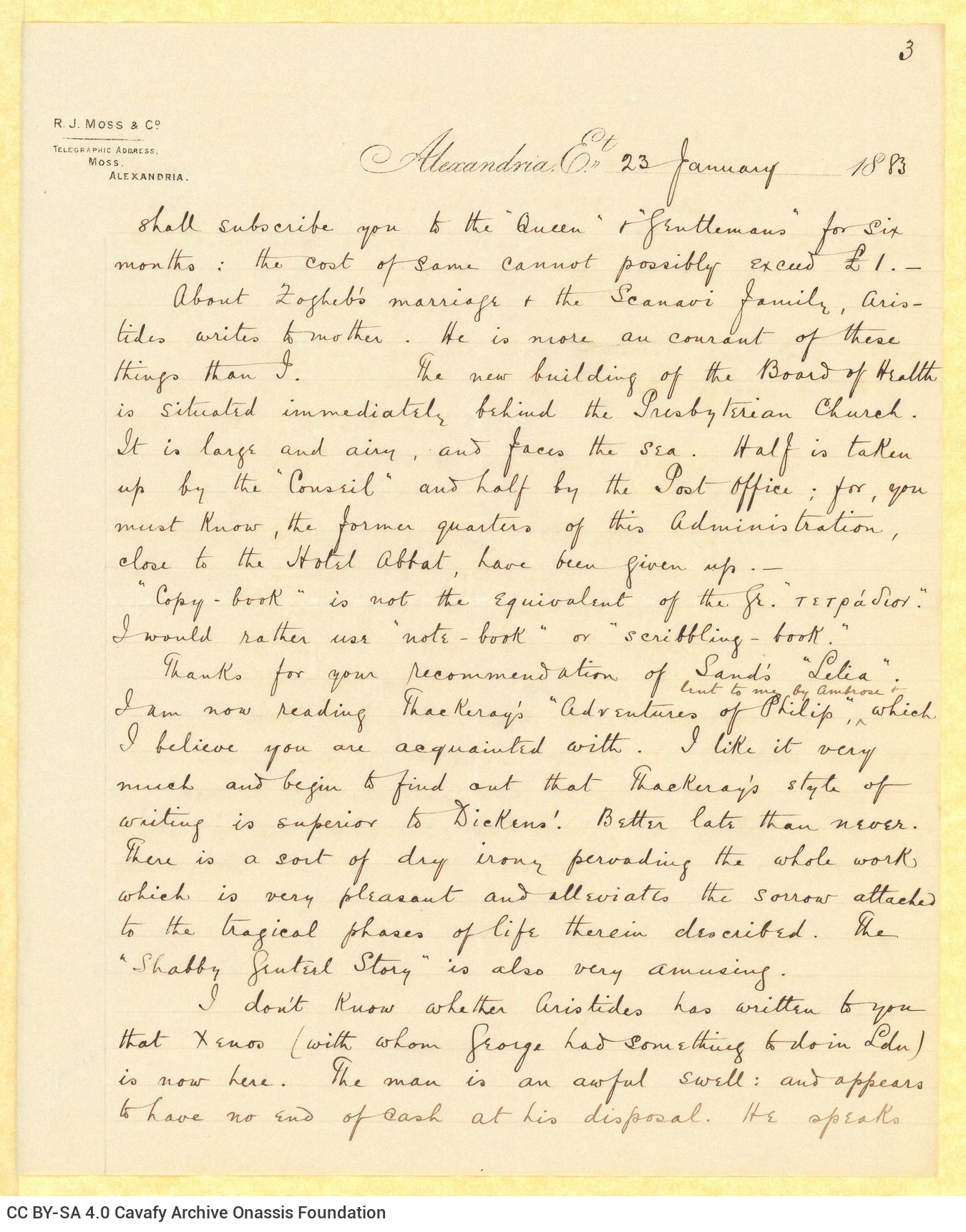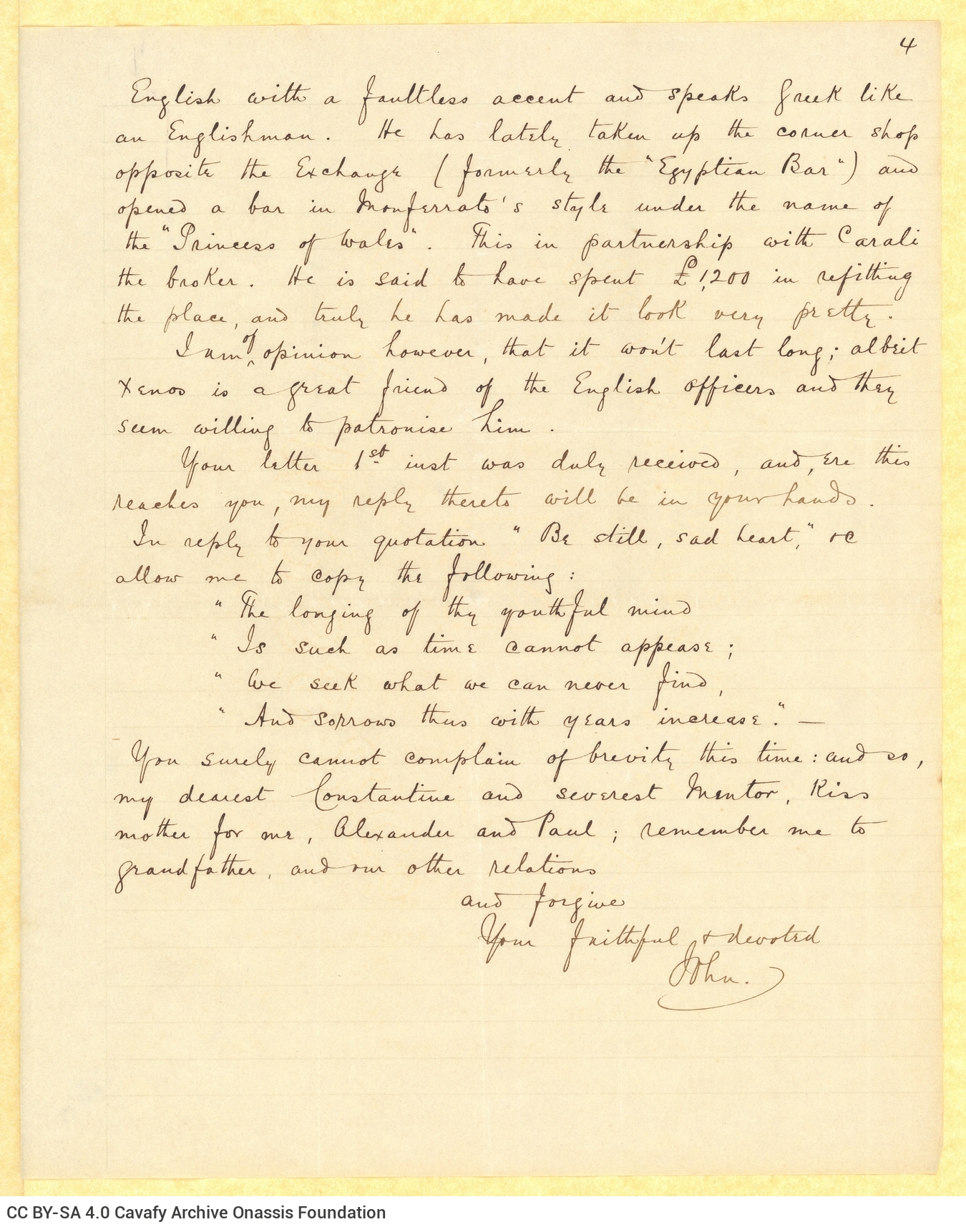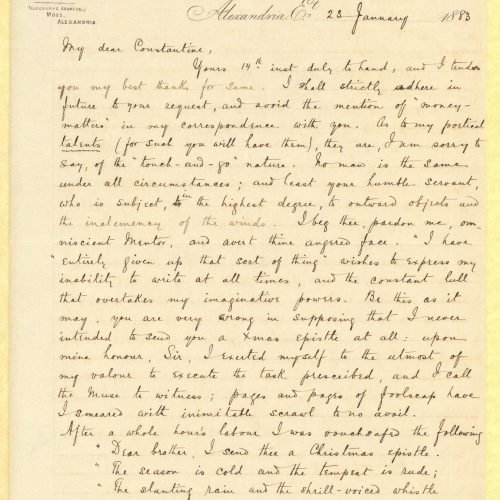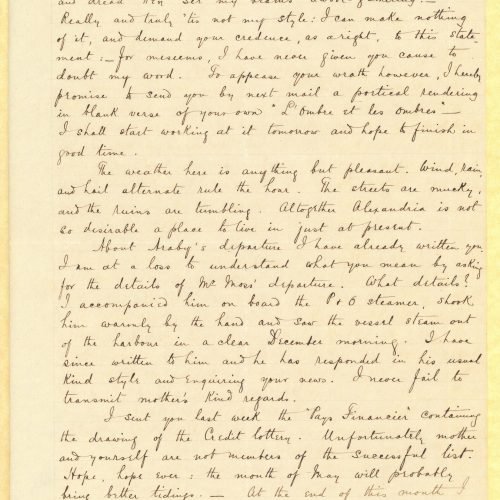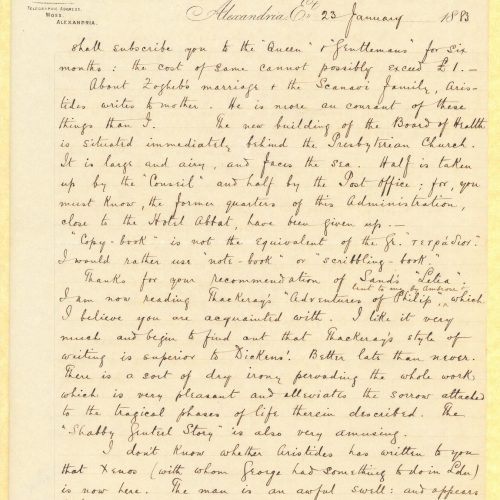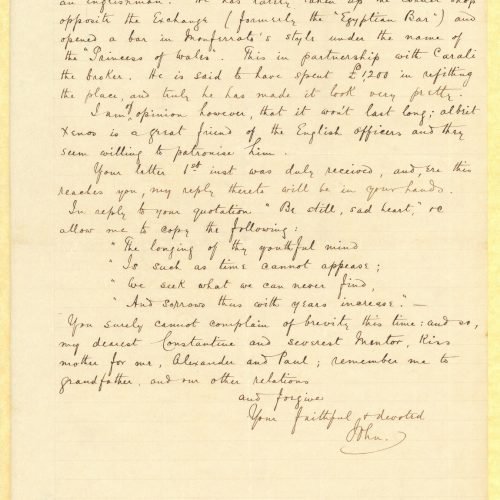Letter by John Cavafy to C. P. Cavafy
[Alexandria] 23 January 1883
My dear Constantine,
Yours 14th instant duly to hand, and I tender you my best thanks for same. I shall strictly adhere in future to your request, and avoid the mention of “money-matters” in my correspondence with you. As to my poetical talents (for such you will have them), they are, I am sorry to say, of the “touch-and-go” nature. No man is the same under all circumstances; and least your humble servant, who is subject, in the highest degree, to outward objects and the inclemency of the winds. I beg thee, pardon me, omniscient Mentor, and avert thine angered face. “I have entirely given up that sort of thing” wishes to express my inability to write at all times, and the constant lull that overtakes my imaginative powers. Be this as it may, you are very wrong in supposing that I never intended to send you a Xmas epistle at all: upon mine honour, Sir, I exerted myself to the utmost of my valour to execute the task prescribed, and I call the Muse to witness; pages and pages of foolscap have I smeared with inimitable scrawl to no avail.
After a whole hour’s labour I was vouchsafed the following
“Dear brother, I send thee a Christmas epistle.
The season is cold and the tempest is rude;
The slanting rain and the shrill-voiced whistle
Of the winds, engender a pensive mood.” ―But beyond this I could not get, for the “Eumenides” and dread “Άτη” set my brains “a wool-gathering”. ― Really and truly ’tis not my style: I can make nothing of it, and demand your credence, as aright, to this statement: ― for meseems, I have never given you cause to doubt my word. To appease your wrath however, I hereby promise to send you by next mail a poetical rendering in blank verse of your own “L’Ombre et les Ombres” ― I shall start working at it tomorrow and hope to finish in good time.
The weather here is anything but pleasant. Wind, rain, and hail alternate rule the hour. The streets are mucky, and the ruins are tumbling. Altogether Alexandria is not so desirable a place to live in just at present.
About Araby’s departure I have already written you. I am at a loss to understand what you mean by asking for the details of Mr. Moss’ departure. What details? I accompanied him on board the Peninsular and Oriental steamer, shook him warmly by the hand and saw the vessel steam out of the harbour in a clear December morning. I have since written to him and he has responded in his usual kind style and enquiring your news. I never fail to transmit mother’s kind regards.
I sent you last week the Pays Financier containing the drawing of the Credit lottery. Unfortunately mother and yourself are not members of the successful list. Hope, hope ever: the month of May will probably bring better tidings. ― At the end of this month Ishall subscribe you to the Queen and Gentleman’s for six months: the cost of same cannot possibly exceed £ 1. ―
About Zogheb’s marriage and the Scanavi family, Aristides writes to mother. He is more au courant of these things than I. The new building of the Board of Health is situated immediately behind the Presbyterian Church. It is large and airy, and faces the sea. Half is taken up by the “Conseil” and half by the Post-Office; for, you must know, the former quarters of this Administration, close to the Hotel Abbat, have been given up. ―
“Copy-book” is not the equivalent for the Greek “τετράδιον”. I would rather use “note-book” or “scribbling-book”.
Thanks for your recommendation of Sand’s Lelia. I am now reading Thackeray’s Adventures of Philip, lent to me by Ambrose and which I believe you are acquainted with. I like it very much and begin to find out that Thackeray’s style of writing is superior to Dickens! Better late than never. There is a sort of dry irony pervading the whole work which is very pleasant and alleviates the sorrow attached to the tragical phases of life therein described. The Shabby Genteel Story is also very amusing.
I don’t know whether Aristides has written to you that Xenos (with whom George had something to do in London) is now here. The man is an awful swell: and appears to have no end of cash at his disposal. He speaksEnglish with a faultless accent and speaks Greek like an Englishman. He has lately taken up the corner shop opposite the Exchange (formerly the “Egyptian Bar”) and opened a bar in Monferrato’s style under the name of the “Princess of Wales”. This in partnership with Carali the broker. He is said to have spent £ 1,200 in refitting the place, and truly he has made it look very pretty.
I am of opinion however, that it won’t last long; albeit Xenos is a great friend of the English Officers and they seem willing to patronise him.
Your letter 1st instant was duly received, and, ere this reaches you, my reply thereto will be in your hands.
In reply to your quotation “Be still, sad heart”, etc. allow me to copy the following:
“The longing of thy youthful mind
Is such as time cannot appease;
We seek what we can never find,
And sorrows thus with years increase.” ―
You surely cannot complain of brevity this time: and so, my dearest Constantine and severest Mentor, kiss mother for me, Alexander and Paul; remember me to grandfather, and our other relations
and forgive
Your faithful and devoted
John.
DIGITAL OBJECT DESCRIPTION
IDENTITY AREA
44 x 27.5 cm
CONTEXT AREA
CONTENT AND STRUCTURE AREA
Handwritten letter by John Cavafy to C. P. Cavafy on the first and third pages of two double sheet letterheads of R. J. Moss & Co., Alexandria. Pages 3 and 4 are numbered at top right. Update on current affairs and on the developments in Alexandria. Thoughts on literary works.
CONDITIONS OF ACCESS AND USE AREA
English
Writing in ink. Watermark: R. J. Moss & Co Alexandria.
ALLIED MATERIALS AREA
“Darkness and shadows” >Α524
NOTES AREA
The transcription and editing of the letters of John Constantine Cavafy addressed to C. P. Cavafy was first carried out by Katerina Ghika; said transcriptions were subsequently uploaded to the official website of the Cavafy Archive.
Reference to the translation of C. P. Cavafy’s poem “L’Ombre et les Ombres” into English by John in blank verse.
